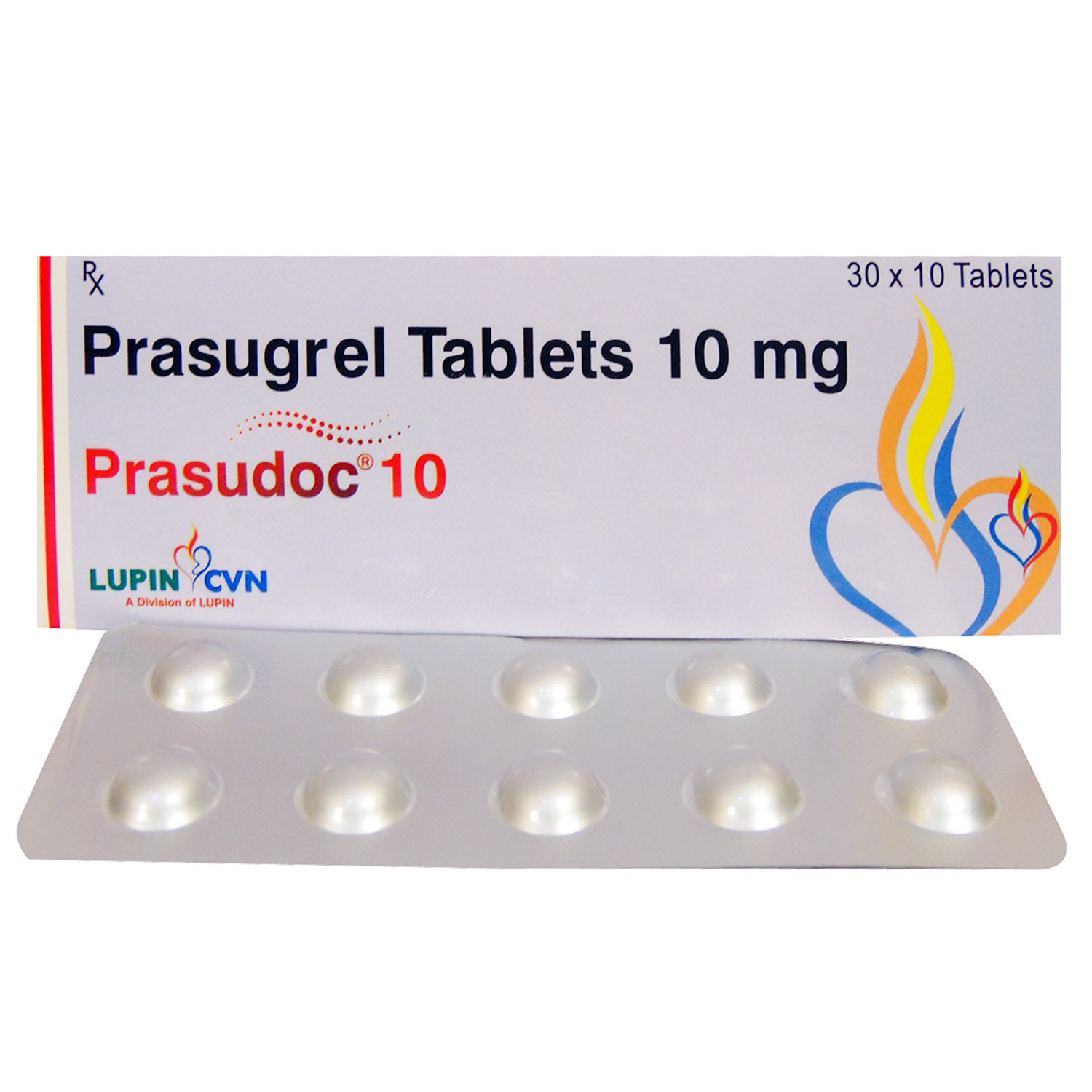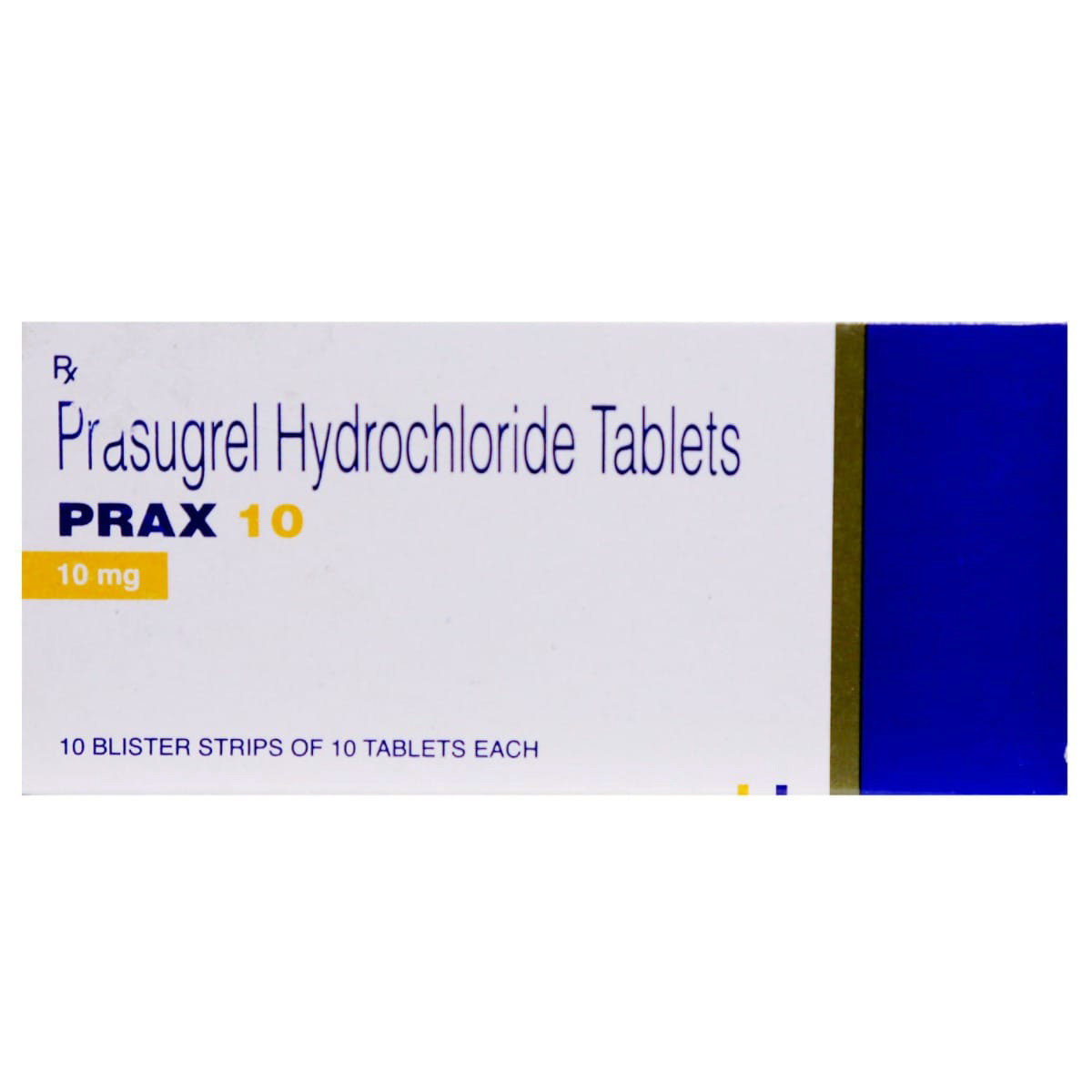Prasugrel
About Prasugrel
Prasugrel belongs to the group of medicines called 'antiplatelet agents' used to prevent the formation of blood clots, thereby reducing the chance of having a heart attack, or stroke in future. Prasugrel is prescribed after a heart attack, unstable angina, or if you have been treated with a procedure to open blocked arteries or have stents to open blocked/narrowed arteries.
Prasugrel contains 'Prasugrel' which works by inhibiting the clumping of platelets, thereby reducing the chance of having blood clot formation. This results in lower cardiovascular events like myocardial infarction (heart attack) or stroke in future, especially in people who have had heart surgery known as angioplasty.
You are advised to take Prasugrel for as long as your doctor has prescribed it for you depending upon your medical consition. In some cases, Prasugrel may cause side-effects such as nose bleeds, skin rash, bleeding in the bowels, blood in urine, low haemoglobin, purpura (blood leakage under the skin), indigestion and bruising. You are advised to talk to your doctor if you experience these side-effects persistently.
Do not take Prasugrel if you ever had a brain stroke, bleeding in the brain or transient ischemic attack (stroke). Talk to your doctor before taking Prasugrel if you weigh below 60 kg, are 75 years or older, have/had a recent severe injury or surgery due to risk of severe bleeding problems. Consult your doctor if you are pregnant or breastfeeding. Prasugrel is not recommended for children as efficacy and safety have not been established.
Uses of Prasugrel
Medicinal Benefits
Prasugrel belongs to the group of medicines called antiplatelet agents used to prevent the formation of blood clots. Prasugrel helps in reducing the chance of having another heart attack or stroke. Prasugrel inhibits platelet aggregation and activation through irreversible binding of its active metabolite to the receptors. Prasugrel works by inhibiting the clumping of platelets, thereby reduces the chance of blood clot formation. This helps in reducing the rate of cardiovascular events such as myocardial infarction (heart attack) or stroke especially in people who have had heart surgery known as angioplasty.
Directions for Use
Storage
Side Effects of Prasugrel
- Nose bleeds
- Skin rash
- Bleeding in bowels
- Blood in urine
- Low haemoglobin
- Purpura (blood leakage under the skin)
- Indigestion
- Bruising
Drug Warnings
Do not take Prasugrel if you are allergic to any of its contents, if you have a medical condition that causes bleeding from the stomach or intestine, had a transient ischemic attack (stroke) or if you are suffering from severe liver disease. Talk to your doctor before taking Prasugrel if you have bleeding problems, weigh below 60 kg, are 75 years or older, had/have a recent serious injury or surgery, kidney or liver disease. Consult your doctor immediately if you develop a medical condition called thrombotic thrombocytopenic purpura (blood disorder) while taking Prasugrel; its symptoms include fever, bruising under the skin which appears as red pinpoint dots, with/without unexplained confusion, tiredness and yellowing of skin and eyes. Consult your doctor if you are pregnant or breastfeeding. Prasugrel is not recommended for children as the efficacy and safety have not been established. People affected with active pathological bleeding (peptic ulcer, intracranial or brain haemorrhage) and history of stroke or transient ischemic attack (TIA) should not take Prasugrel.
Drug Interactions
Drug-Drug Interactions: Prasugrel may interact with pain killers (aspirin, ibuprofen, celecoxib, hydrocodone, tramadol), blood thinners (clopidogrel, dalteparin, enoxaparin, rivaroxaban, warfarin), antacids (esomeprazole, omeprazole), and drug used to prevent heart attack or stroke (ticagrelor).
Drug-Food Interactions: Avoid smoking and alcohol consumption.
Drug-Disease Interactions: Inform your doctor if you have bleeding problems, coronary and cerebral vascular disease, liver or kidney disease.
Drug-Drug Interactions Checker List:
Safety Advice

Alcohol
unsafeYou are recommended to avoid alcohol consumption while taking Prasugrel to prevent unpleasant side-effects. Alcohol intake might increase the risk of stomach or intestine bleeding.

Pregnancy
cautionPlease consult your doctor if you have any concerns regarding this, your doctor will prescribe only if the benefits outweigh the risks.

Breast Feeding
cautionPlease consult your doctor if you have any concerns regarding this; your doctor will prescribe only if the benefits outweigh the risks.

Driving
safe if prescribedPrasugrel does not affect your ability to drive. However, do not drive or operate heavy machinery if you are not alert.

Liver
cautionDose adjustment may be needed. Prasugrel should be used with caution in patients with liver impairment/liver disease. Please consult your doctor if you have liver impairment/liver disease or any concerns regarding this.

Kidney
cautionDose adjustment may be needed. Prasugrel should be used with caution in patients with kidney impairment/kidney disease. Please consult your doctor if you have kidney impairment/kidney disease or any concerns regarding this.

Children
unsafePrasugrel should not be used by children, as the efficacy and safety have not been established.
Habit Forming
Diet & Lifestyle Advise
- Eat a diet rich in whole grains, vegetables, fruits, skinless poultry, fish, eggs, and low-fat dairy products.
- Avoid smoking and alcohol consumption.
- Maintain a healthy weight with proper diet and exercise.
- Managing stress with meditation, yoga, and massage.
- Avoid eating fried food, fast food, boxed food, canned food, and processed frozen meals.
Special Advise
Regular haemoglobin and hematocrit diagnostic tests are recommended if you are taking Prasugrel.
Patients Concern
Disease/Condition Glossary
Blood clot: Platelets are small cell particles that circulate in the blood. When the blood vessel is damaged or cut, the platelets clump together and lead to the formation of a clot, thereby prevents bleeding. The formation of clots in arteries can cut off the blood supply, leading to heart attack, stroke or death. Clot formation in the arteries that supply blood to the heart may cause reduced blood flow which could lead to unstable angina (chest pain).
Myocardial infarction: Myocardial infarction, also known as a heart attack or stroke could occur due to the lack of blood and oxygen supply in the heart. Symptoms include chest pain, upper body pain, sweating, weakness, trouble breathing, lightheadedness and nausea.
FAQs
Prasugrel works by inhibiting the clumping of platelets, thereby reduces the chance of blood clot formation. This helps in reducing the rate of cardiovascular events such as myocardial infarction (heart attack) or stroke.
Prasugrel prevents the formation of blood clots so it might increase the risk of bleeding during injury, cut or surgery. Therefore, be cautious while using sharp objects. Consult a doctor immediately if you notice excess bleeding. Let your doctor know if you are going to have any scheduled surgery as your doctor might reduce the dose to avoid excess bleeding during surgery.
Please do not stop taking Prasugrel on your own, as it might increase the risk of a heart attack. Continue taking Prasugrel for as long as your doctor has prescribed it to you. Do not be reluctant to speak with your doctor if you experience any difficulty while taking Prasugrel.
Prasugrel may cause anaemia (low haemoglobin and low red blood cell count). So it would be best if you include iron-rich food in your diet to prevent anaemia.
Avoid taking non-steroidal anti-inflammatory drugs (pain-relieving medicines) like aspirin along with Prasugrel as it may increase the risk of gastrointestinal ulcer and bleeding.





